
Hell, Revealed

In the early 1990s a young Chinese doctor uncovered, and reported, an HIV epidemic connected to a network of plasma collection centers in Henan Province. Instead of being hailed as a hero, the doctor was threatened, ostracized and beaten. As many as a million people would die of AIDS.
Now the chilling story of Dr. Wang Shuping is being told in “The King of Hell’s Palace,” a thriller written by UC Santa Barbara scholar Frances Ya-Chu Cowhig, an associate professor of theater and dance and head of the Dramatic Writing concentration.
The play received its world premiere at London’s Hampstead Theatre Thursday, Sept. 12. Directed by Michael Boyd, former artistic director at the Royal Shakespeare Company, it runs through Oct. 12.
Cowhig first met Wang when the American was a teenager in Beijing. Later, after both had moved to the U.S., Cowhig interviewed Wang several times. What she found was a story of extraordinary courage and corruption.
“My play alternates between the story of a rural family trying to pull itself out of poverty by selling their blood plasma,” Cowhig said, “and the story of a family of Ministry of Health employees whose lives and relationships are profoundly affected by their involvement in the Ministry of Health’s plasma collection business.”
(Editor's note: Wang died of an apparent heart attack Sept. 21 while hiking in Utah. She was 59.)
Although parts of the story are fictionalized, the consequences of Wang’s whistle-blowing are quite real — and ongoing. Members of her family and former colleagues in Henan still are harassed by Chinese State Security whenever she speaks publicly about the way the Henan Ministry of Health caused a rural AIDS epidemic, Cowhig noted.
Indeed, Chinese security agents have been leaning on her family and former co-workers to pressure Wang to stop production of the play.
“With bullying and censorship, the government has covered up the HCV (Hepatitis C virus) and HIV epidemics in China very successfully,” Wang said in a statement. “Why, in 2019, do they worry so much about a play being produced in London, 24 years after the events it depicts?
“The only thing harder than standing up to the Communists and their security police is not giving in to pressure from friends and relatives who are threatened with their livelihoods all because you are speaking out,” she continued. “But even after all this time, I will still not be silenced, even though I am deeply sad that this intimidation is happening yet again. ‘The King of Hell’s Palace’ will go ahead and I am really looking forward to seeing the production.”
Wang, who is considered a hero among many public health officials in China, will attend the play’s premiere, Cowhig said.
“The King of Hell’s Palace” — the title was inspired by a dream of Wang’s — is Cowhig’s third in a trilogy of plays set in China. Her previous play, “Snow in Midsummer,” was performed by the Royal Shakespeare Company at its Swan Theatre in the Bard’s Stratford-Upon-Avon in 2017. She came to the attention of the RSC with the production of her “The World of Extreme Happiness” in 2013.
Now, she said, it’s time to explore new horizons.
“I devoted much of the past decade to developing a trilogy of plays set in contemporary China, and am now moving away from straight plays towards musical theater and screenwriting projects,” Cowhig said. “More immediately, I am spending my upcoming fall and winter quarter on sabbatical in Taiwan engaged in Taiwanese and Mandarin intensives, and will also be doing research for a young adult fantasy book series set in Taiwan that I intend to devote much of the next decade to.”



